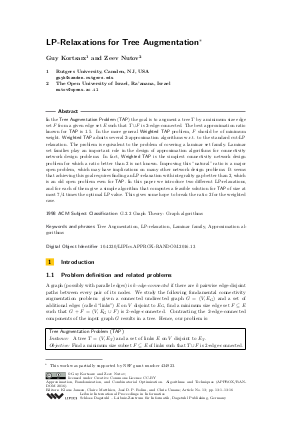LP-Relaxations for Tree Augmentation
Authors Guy Kortsarz, Zeev Nutov
-
Part of:
Volume:
Approximation, Randomization, and Combinatorial Optimization. Algorithms and Techniques (APPROX/RANDOM 2016)
Part of: Series: Leibniz International Proceedings in Informatics (LIPIcs)
Part of: Conference: International Conference on Randomization and Computation (RANDOM)
Part of: Conference: International Conference on Approximation Algorithms for Combinatorial Optimization Problems (APPROX) - License:
 Creative Commons Attribution 3.0 Unported license
Creative Commons Attribution 3.0 Unported license
- Publication Date: 2016-09-06
File

PDF
LIPIcs.APPROX-RANDOM.2016.13.pdf
- Filesize: 1.08 MB
- 16 pages
Document Identifiers
Subject Classification
Keywords
- Tree Augmentation; LP-relaxation; Laminar family; Approximation algorithms
Metrics
- Access Statistics
-
Total Accesses (updated on a weekly basis)
0Document
0Metadata
Abstract
In the Tree Augmentation Problem (TAP) the goal is to augment a tree T by a minimum size edge set F from a given edge set E such that T+F is 2-edge-connected. The best approximation ratio known for TAP is 1.5. In the more general Weighted TAP problem, F should be of minimum weight. Weighted TAP admits several 2-approximation algorithms w.r.t. the standard cut-LP relaxation. The problem is equivalent to the problem of covering a laminar set family. Laminar set families play an important role in the design of approximation algorithms for connectivity network design problems. In fact, Weighted TAP is the simplest connectivity network design problem for which a ratio better than 2 is not known. Improving this "natural" ratio is a major open problem, which may have implications on many other network design problems. It seems that achieving this goal requires finding an LP-relaxation with integrality gap better than 2, which is an old open problem even for TAP. In this paper we introduce two different LP-relaxations, and for each of them give a simple algorithm that computes a feasible solution for TAP of size at most 7/4 times the optimal LP value. This gives some hope to break the ratio 2 for the weighted case.
Cite As Get BibTex
Guy Kortsarz and Zeev Nutov. LP-Relaxations for Tree Augmentation. In Approximation, Randomization, and Combinatorial Optimization. Algorithms and Techniques (APPROX/RANDOM 2016). Leibniz International Proceedings in Informatics (LIPIcs), Volume 60, pp. 13:1-13:16, Schloss Dagstuhl – Leibniz-Zentrum für Informatik (2016)
https://doi.org/10.4230/LIPIcs.APPROX-RANDOM.2016.13
BibTex
@InProceedings{kortsarz_et_al:LIPIcs.APPROX-RANDOM.2016.13,
author = {Kortsarz, Guy and Nutov, Zeev},
title = {{LP-Relaxations for Tree Augmentation}},
booktitle = {Approximation, Randomization, and Combinatorial Optimization. Algorithms and Techniques (APPROX/RANDOM 2016)},
pages = {13:1--13:16},
series = {Leibniz International Proceedings in Informatics (LIPIcs)},
ISBN = {978-3-95977-018-7},
ISSN = {1868-8969},
year = {2016},
volume = {60},
editor = {Jansen, Klaus and Mathieu, Claire and Rolim, Jos\'{e} D. P. and Umans, Chris},
publisher = {Schloss Dagstuhl -- Leibniz-Zentrum f{\"u}r Informatik},
address = {Dagstuhl, Germany},
URL = {https://drops.dagstuhl.de/entities/document/10.4230/LIPIcs.APPROX-RANDOM.2016.13},
URN = {urn:nbn:de:0030-drops-66366},
doi = {10.4230/LIPIcs.APPROX-RANDOM.2016.13},
annote = {Keywords: Tree Augmentation; LP-relaxation; Laminar family; Approximation algorithms}
}
